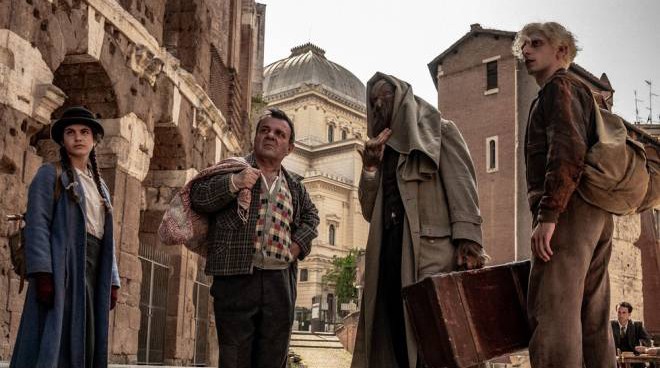THE SHIFT
(yet) untapped potential
It would be too simplicistic to label The Shift as the “latvian” Taxi Driver. Debuting director Reinis Kalvins‘s purposes, as he claims himself, are to avoid crafting a ‘genre film’ (as he marginally implies Taxi Driver to be) and to shape an atmospheric work that would describe a state of being, of distress. The result however leaves to be desired.
 |
Inspired by news outlets about unrest among taxi drivers in Riga that compete for the more profitable locations of the Baltic capital, Kalvins’ film aims at following a night shift of one of these drivers, Mareks, who is also simultaneously trying to cope with personal economical difficulties, further shattered by a series of unfortunate events that seem to escalate in a dangerous vortex.
The premise is more than promising: unity of time to describe a human condition, and even a potentially exciting plot that allows the viewer to be entertained, but despite the description of the plot bears resemblances with the works of the Safdies, such a comparison cannot be more out of the line. The Shift’s pacing is eons away from the Safdies’ anxiety inducing thriller. Even the excellent opening shot, a pan-out from a rearview mirror to the full windscreen as Mareks drives fast, seemingly chased by an opposing taxi, suggests a dynamic film.
In truth, we are in front of what we would commonly define a “slow burn”, too slow to manage to fully grasp the viewer’s attention.
An impassible acting, the absence of anything that might count as a score (or even to some sort of sound effect subtext) a prominence of static framing and too much artificial lighting are a dangerous mixture: not only are most of the scenes dried out of anything that might be appealing to a viewer, but together they are – simply put - narcoleptic. It is easy to object that Kalvins apparently opted to remove anything that would “embellish” the story he is trying to show us, maybe in his effort to distance his work from genre cinema, as he stated, and to build an atmosphere embedded with realism, but we are very far from the hyperrealist efforts of Puiu or Mungiu: the frames are too polished, the lighting too artificial. The film suffers from being in a middle condition between a stylistically constructed work and an entirely subtracted narration. Kalvins’ aspirations to drive the viewer into an atmospheric world are thus barren: instead of delving the viewer into the promised atmosphere of unrest and distress, the absence of a more daring style (and paradoxically here “daring” can be intended in both ways, either more daring in being a conventional, semi-genre film, or one more in line with the Romanian New Wave films previously mentioned) leads to a dry work.
Despite the obvious flaws, The Shift does present a number of remarkable choices. For one, the persistence of the leitmotif of the money, central to almost every line of dialogue, its shortage, as an objectual representation of the struggles that are central to Mareks’ experiences. Several striking lines of dialogue had a palpable effect on the few audience members that were still awake to grasp them, and the sequence of events, which at first appeared questionable and leading to nowhere, ends up building a tightly constructed structure with no open ends. Key scenes would have had a strong sense of gravitas, if their strength were not jeopardized by the tediousness in the pacing of the scenes leading up to them. Such an example would be Mareks’ exchange with a drunk VIP, who blames the protagonist of being too attached to money. Or even the final “climax”, if we may call it so. In other words, we may have been in front of a well written screenplay, with flawed stylistical choices in its representation.
Edgars Ozolins’ performance is also worth mentioning. In his first screen debut, he managed to portray a purposefully subtle and dried out performance mostly based on non-verbal acting, which is something remarkable, given his background as theater actor, a background that often bears the dangers of an overly pompous, exaggerated on-screen appearance. Ozolins had no such issue and proved in this performance that he can easily undertake a cinematic career.
It is a flawed debut, but if the viewer was allowed to be more engaged in the work, it would have probably been an excellent debut, and there are enough clues to suggest that Kalvins is a director with true potential that is yet to be unleashed.


Comments
Post a Comment